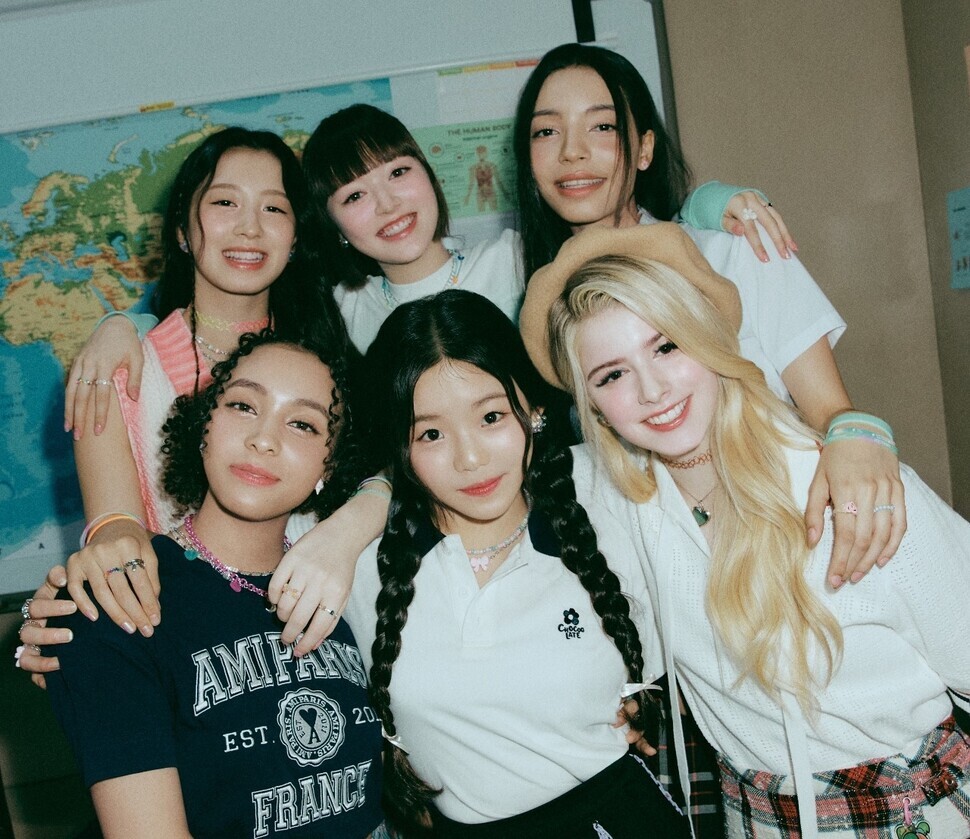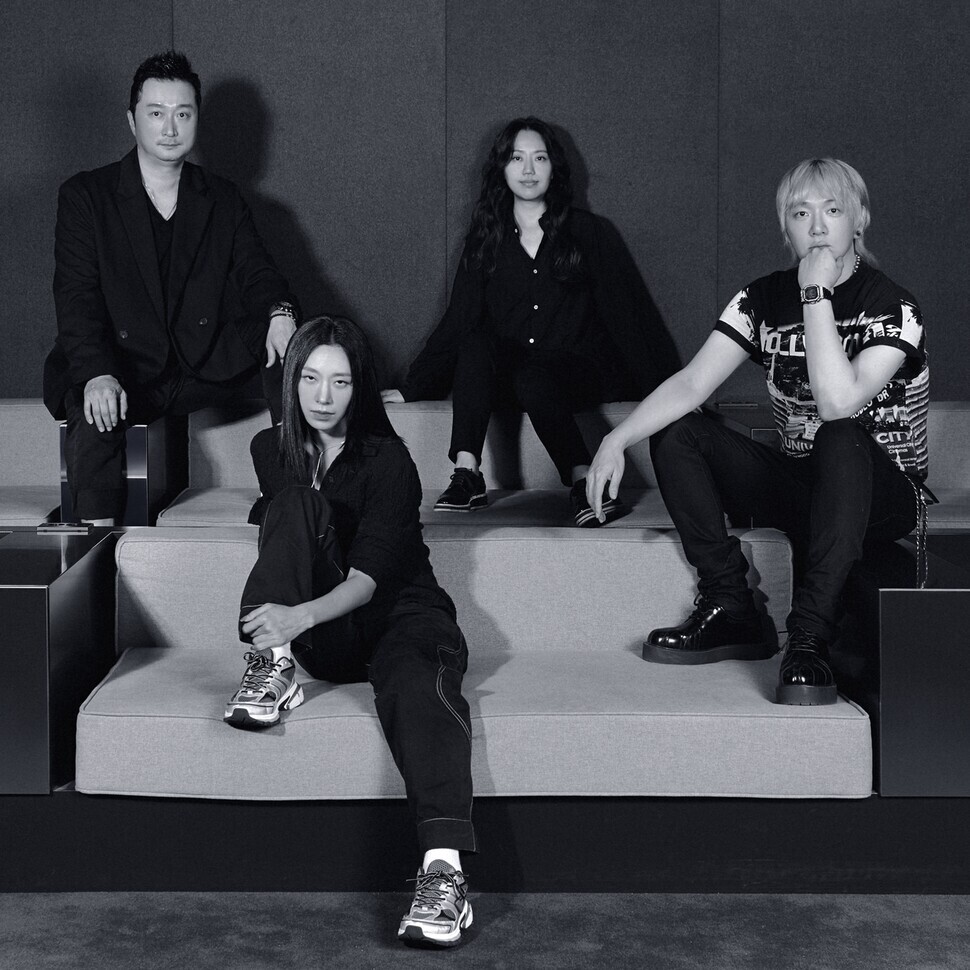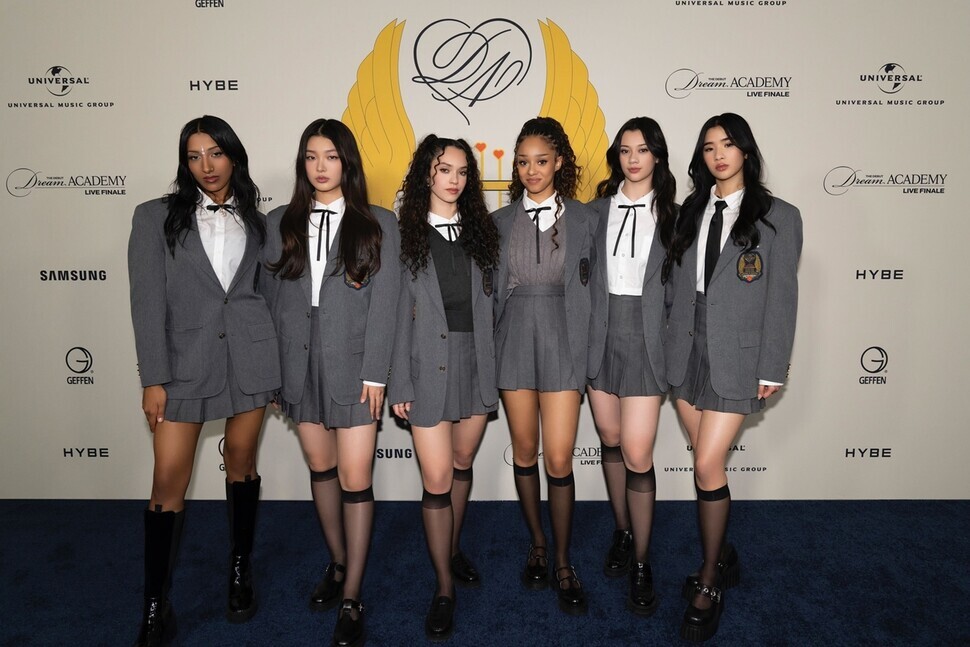hankyoreh
Links to other country sites 다른 나라 사이트 링크
Welcome to the era of K-pop without the K

“For the past 20 years or so, K-pop has always been branching out into the rest of the world. It’s a history of tackling global markets, beyond Japan, China, and the rest of Asia and into places like the US and Europe. Traveling to the US last year, I saw that the influence of K-pop has grown immensely compared with before the COVID-19 pandemic. I had the thought, ‘What if I create a K-pop company that has its start in the US, the very heart of entertainment?’ That’s how it started.”
These remarks by Han “Nikki” Se-min, the chairperson of Titan Content, came at a Nov. 29 launch ceremony held at the company’s offices in the Nonhyeon neighborhood of Seoul’s Gangnam District. Titan Company is a specialized K-pop company that Han founded in the US last April. It’s the first example to date of a K-pop company being established in the US from the outset.
Following its incorporation in Korea in June and the launch of a Korean office last month, the company plans to open up its head office in Los Angeles next January.

Increasingly, there has been a trend in K-pop of attempting to hit the ground running beyond Korea’s borders. In addition to companies like Titan Content that have started out in the US, large K-pop companies like Hybe and JYP Entertainment have been experimenting with multinational K-pop groups that are making their first releases in the US.
Indeed, some of the “K-pop” groups have no Korean members at all. Experts have suggested that K-pop has reached a stage where the system itself is becoming globalized beyond the geopolitical meaning associated with Korea.
Han was previously CEO of SM Entertainment, a company that has been a leading force in K-pop for over two decades.
Titan’s other three founding members have similarly illustrious backgrounds. They include CEO Kang “Katie” Jung-ah, another figure with a history at SM, where she helped discover and develop acts such as TVXQ, Girls’ Generation, EXO, and The Boyz; chief performance officer Lia Kim, who has created choreography for Twice, Mamamoo, and Sunmi; and chief visual officer Lee Guiom, who has created visuals for Seventeen, GOT7, and The Boyz.
The company’s investors include many global investment companies, and local US media such as Variety and Billboard have covered the launch intensively.
Titan Content’s aim is to launch two multinational boy bands, two girl groups, and one male and female solo act by 2028. The plan is to announce the first new act in 2025 after global auditions next year.
Other activities include a platform project using new technologies such as web3, the metaverse, and artificial intelligence. These are to function as platforms where K-pop artists affiliated with a smaller entertainment agency can come together more easily with their fans around the world. It represents a global expansion of the K-pop production system and fan base business model.

The large entertainment companies that have been the leading forces in the K-pop wave to date have also been busily adopting new approaches. Chairperson Bang Si-hyuk of Hybe, the company that developed BTS, has often remarked that the time has come to “take the ‘K’ off ‘K-pop.’”
The idea is that Korean pop music needs to expand its consumer base in bigger markets beyond the current limited fan bases. Bang has expressed concerns that K-pop could otherwise end up facing a crisis and limits to its growth.
The first step that he is taking as a new step forward is the launch of a multinational K-pop group based on global auditions.
After a process lasting around two years, Hybe recently reached a final decision on the six members of its global girl group Katseye: Sophia (the Philippines), Lara (US), Yoonchae (Korea), Megan (US), Daniela (US), and Manon (Switzerland).
Selected through the audition program “The Debut: Dream Academy” — a collaboration between Hybe and the US-based Geffen Records — the members have begun preparations for their US debut.
In an interview with the US business news outlet Bloomberg, Bang said the aim of his problem was to contribute to expanding the scope and permanence of Korea by developing the act into one of the world’s premier recording acts.
JYP Entertainment is the agency responsible for Stray Kids, which has topped the main Billboard 200 album chart with its last four releases. Now the company is hard at work on preparations for the debut of its global girl group Vcha.
Vcha emerged from the global audition project A2K (“America2Korea”), a collaboration between JYP and Republic Records, which is affiliated with the Universal Music Group.

After visits to Korea and five major US cities, the final list of six members (Lexi, KG, Camila, Savanna, Kaylee, and Kendall) was decided in September. They include four Americans, one Canadian, and one member with dual Korean-US citizenship.
The group followed the release of its first pre-debut single “SeVit (New Light)” last September with its second pre-debut single “Ready for the World” last Friday. Vcha is set to make its official debut on Jan. 26 of next year.
SM has also begun a project in partnership with the UK entertainment group M&B to locally develop a boy band act.
Even in Korea, you don’t have to look far to find a number of interesting examples of K-pop groups without any Korean members. Blackswan, a girl group formed by the smaller agency DR Music, debuted in 2020. While it first launched as a group with both Korean and non-Korean members, soon the Korean members left and more non-Koreans were added, making it a fully foreign group as of last year. Currently, its active members include Gabi (Brazil), Sriya (India), Nvee (US), and Fatou (Belgium).
In addition to their activities in Korea, Blackswan has been busy working around the globe, just finishing up a four-city US tour last month. StarBe, an Indonesian pop group that spent August through November in Korea to receive K-pop training, has even melded their own music and K-pop, carving out a new genre we could call Korean-Indonesian fusion pop.

Industry experts are paying keen attention to these developments. At the K-pop Radar conference last month, music startup Space Oddity, along with music critics Kim Young-dae, Kim Yoon-ha, and Cha Woo-jin, as well as Jeong So-yeon, the fandom researcher at Blip, a K-pop schedule app, picked “K-pop without the K” as one of the keywords in K-pop trends this year.
“We at Blip, while providing services for K-pop idols, sometimes ponder over the boundaries and definitions of K-pop,” said Jeong. “But ultimately the category of K-pop seems to be expanding.”
Kim Young-dae predicted during the debate on the diversifying definitions of K-pop that “if the current trend continues, a time may come when we wouldn’t blink at the fact that a Korea-made K-pop group, a Korea-made foreigner K-pop group, a joint Korea-foreign-made K-pop group, and a non-Korean made K-pop-esque group could be competing on the Billboard Top 10.”
By Suh Jung-min, staff reporter
Please direct questions or comments to [english@hani.co.kr]

Editorial・opinion
![[Editorial] Korea must respond firmly to Japan’s attempt to usurp Line [Editorial] Korea must respond firmly to Japan’s attempt to usurp Line](https://flexible.img.hani.co.kr/flexible/normal/500/300/imgdb/original/2024/0514/2317156736305813.jpg) [Editorial] Korea must respond firmly to Japan’s attempt to usurp Line
[Editorial] Korea must respond firmly to Japan’s attempt to usurp Line![[Editorial] Transfers of prosecutors investigating Korea’s first lady send chilling message [Editorial] Transfers of prosecutors investigating Korea’s first lady send chilling message](https://flexible.img.hani.co.kr/flexible/normal/500/300/imgdb/original/2024/0514/7917156741888668.jpg) [Editorial] Transfers of prosecutors investigating Korea’s first lady send chilling message
[Editorial] Transfers of prosecutors investigating Korea’s first lady send chilling message- [Column] Will Seoul’s ties with Moscow really recover on their own?
- [Column] Samsung’s ‘lost decade’ and Lee Jae-yong’s mismatched chopsticks
- [Correspondent’s column] The real reason the US is worried about Chinese ‘overcapacity’
- [Editorial] Yoon’s gesture at communication only highlights his reluctance to change
- [Editorial] Perilous stakes of Trump’s rhetoric around US troop pullout from Korea
- [Guest essay] Preventing Korean Peninsula from becoming front line of new cold war
- [Column] The state is back — but is it in business?
- [Column] Life on our Trisolaris
Most viewed articles
- 1[Editorial] Korea must respond firmly to Japan’s attempt to usurp Line
- 2Major personnel shuffle reassigns prosecutors leading investigations into Korea’s first lady
- 3[Column] Will Seoul’s ties with Moscow really recover on their own?
- 4[Editorial] Transfers of prosecutors investigating Korea’s first lady send chilling message
- 5US has always pulled troops from Korea unilaterally — is Yoon prepared for it to happen again?
- 6Exchange rate, oil prices, inflation: Can Korea overcome an economic triple whammy?
- 7[Editorial] Perilous stakes of Trump’s rhetoric around US troop pullout from Korea
- 8[Column] Samsung’s ‘lost decade’ and Lee Jae-yong’s mismatched chopsticks
- 9Korean opposition decries Line affair as price of Yoon’s ‘degrading’ diplomacy toward Japan
- 10Naver’s union calls for action from government over possible Japanese buyout of Line